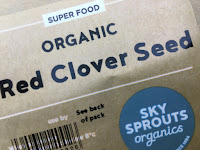 |
| So many questions! |
One of the good things about C-19 is the range of online courses, talks and groups seems to have grown enormously. In recent years there have been growing numbers of resources and in addition to those, it seems like every other week there is some big US conference with info related to people living with cancer.
At the moment there are two days left of ‘The Mind, Body & The Vagus Nerve Connection Summit’ (i). I’ve only dipped into a couple of their talks - there seems to be a growing knowledge about the importance of the vagus nerve. It has also been called the “10th cranial nerve” and is the longest, largest, and most complex of the cranial nerves. Researchers are linking its activity to migraines, inflammatory bowel disease, depression, arthritis, and many other illnesses. It has been interesting to become more aware of this key nerve but can see we are only just beginning to understand it’s complexity (ii).
However I also want to note a 'health warning'; I have a tendency to throw myself into learning rather than actually making time for the being. Yes I love understanding more - and for some of us that is key - but am also aware, understanding is only a tiny part of the picture - and as we know only too well, alot of the views can be diametrically opposed. So take care when embarking on learning more! However having said that I think the stuff below is very useful!
Online Wigwam Cancer Support Group and Forums
Two weeks ago I started working a few hours a week for Yes to Life on their Wigwam Cancer Support project. I have already co-founded the Stroud Wigwam (iii) more than 18 months ago and been involved supporting the new developments around Wigwam, but am delighted to now be more involved in helping build the website, groups and Forum. We have been doing fortnightly free Forums on a range of topics including fear, exercise, functional medicine and mindfulness. The last one had over 70 people on Zoom; there is a chance to ask questions but you can also remain anonymous if you wish. We are planning more (with a break in August) but also welcome ideas for future Forums.
Wednesday 24th June at 4pm - 'Mushroom Bioscience to promote quality of life’ - this is the next Forum and is with Hania (BSc, LicAc, BHSc, MBAcC), who has worked in the health and wellness sphere for over 10 years. She draws her experience of working in 5 star wellness resorts and in clinical practice as a traditional Chinese Medicine Acupuncturist, Naturopath and Life Alignment coach. Book here (iv)
Wednesday 1st July at 4pm - Online Wigwam Cancer Support Group - this is different from the Forum and is about a small online group of people living with cancer, coming together regularly to support each other, and explore and share information about lifestyle and cancer care choices. Seven people have expressed an interest or joined the first meeting and would love to welcome a few more to this next meeting. The group is initially being facilitated by myself and Clare who is a Yes to Life Trustee, Mindfulness tutor and experienced her own cancer journey. Once you are signed up we will send you details of how we will connect on Zoom. To join, please complete the Get Involved Form, ticking the 'Join an Online Group' box here (v). You can also hear more about the Support Groups in this new radio show with myself and Clare: https://www.ukhealthradio.com/player/?ep=21463
Access to Wigwam resources - The 'Get Involved' form (v) is a great way to connect if you are interested in other aspects of the charity, but it is also worth noting that you can join Wigwam. To do this go to the top of the Home page and 'Register'; this will give access to the 'Resouces' section which will contain recordings of all the previous Forums.
Introducing the ‘Trew Health Taster Series’
23rd- 25th June - 3 days of free health, healing & inspiration masterclasses
Well, like many I was disappointed to miss Trew Fields Festival this year - it is such an inspiring event. You can see my long or short film of last year here. Anyhow the wonderful news is that there is a chance to get a bit of a 'Trew-fix’ next week. Here’s the programme;

• Masterclass with Dr Nasha Winters- Treat the terrain not just the tumour – 23rd June, 8.15pm
• Meditation with Naomi- Naylou Holistics – 24th June, 7pm
• Breathwork workshop with Nicola Price – Inspirational Breathing- 24th June, (after the meditation with Naomi) 7pm
• Chronobiology & Herbal Medicine, ‘How to’ talk with Dr Sam Watts: Mind-Body Medical, 25th June, 12.30pm
• Why all mushrooms are magic, a talk with Martin Powell, 25th June, 7.30pm
More details at: https://trewfields.com/trew-health/
Just released; videos of last years Trew Festival speakers
 |
| Fi at Trew Fields last year |
I have just been revisiting these four films of speakers from last year that have just been made public. They are so worth a revisit and give those who haven’t experienced Trew a flavour of the quality of talks they put on.
Fi Munro's talk at Trew Fields 'Live Like You’re Dying’ is very powerful with so much food for thought even on a second listen - see here (vi). Fi’s not so well at the moment but if you follow her on Facebook she still has this amazing ability to bring joy and live her mantra 'Live Like You’re Dying’ - a total inspiration and I also recommend her book - see here (vii).
Fi Munro's talk at Trew Fields 'Live Like You’re Dying’ is very powerful with so much food for thought even on a second listen - see here (vi). Fi’s not so well at the moment but if you follow her on Facebook she still has this amazing ability to bring joy and live her mantra 'Live Like You’re Dying’ - a total inspiration and I also recommend her book - see here (vii).
Rob Verkerk's talk 'Keto- fad, fake or breakthrough?’ Gives me food for thought as big questions around ketogenic diet and prostate cancer. I’m still getting my head around all that - one day a blog is coming! See his talk here (viii).
 |
| Leanne and Saima |
Dr Nasha Winters 'Treating the Terrain, Not Just the Tumour' is wonderful and so comprehensive. I remember the speaker who came after her, Sophie Sabbage, made a lovely comment recognising how daunting it might be if you were to try all the aspects of the terrain - to me this is to be worked on over a long period of time - so don’t be too daunted listening into this here (ix)!
Leanne Pero and Saima Thompson talking about cultural challenges for ethnic minorities - see here (x). I did a quick blog here last year (xi) as this issue still doesn’t get enough attention - that is an understatement.
A masterclass in shifting fear, loneliness and grief
I’ve been doing this excellent course online and it seems like you can still join it. Sophie Sabbage, author of my favourite ‘cancer book’, 'The Cancer Whisperer' launched this 10 week course for $149 to look at how we can 'shift fear, loneliness and grief’ and 'lead us to experience the greatest connection we have ever know’. There are discounts available.
Previously I have been on a one day course with Sophie and she is certainly one of the most experienced facilitators that I’ve come across. She is living up to that in this course looking at life shocks and how we can learn from them - well its more than that - and brings to life her second book ‘Lifeshocks And How to Love Them’. Unfortunately the regular webinars are the same night each week so with other commitments I’ve missed some but they have recordings of them available so you can still be a part of it all. I’m learning lots but I does require time in your week - this really is an investment in wellbeing not a quick fix. More info at: https://www.moretolife.academy/
What else?
Well some of the other cancer charities like Maggies and Penny Brohn have got some good online workshops and courses at the moment - I joined a nutrition one at Penny Brohn that was great. Lastly my next blog will look at a website that I've come across with some really useful info....
Notes
(ii) https://elemental.medium.com/science-confirms-that-the-vagus-nerve-is-key-to-well-being-c23fab90e211
(viii) https://vimeo.com/372603949















